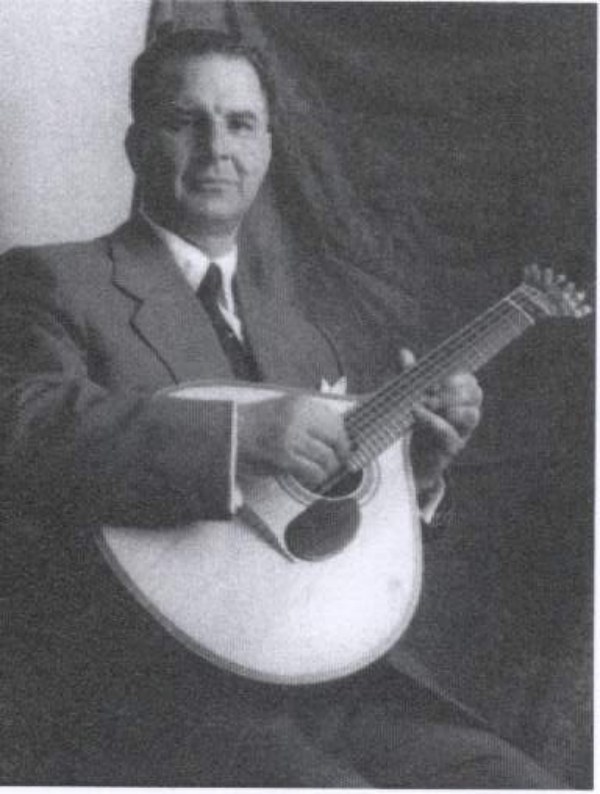Know more:
Artur Paredes
(N. 10 May, 1899 - M. 20 December, 1980)Artur Paredes was born in Coimbra, at the turn of the twentieth century, on the 10 May 1899. Son of Gonçalo Rodrigues Paredes (who graduated in the Coimbra University in 1912) and nephew of Manuel Paredes, both distinguished players of Portuguese guitar at Coimbra, Artur Paredes soon showed that his skills were much superior. Artur Paredes therefore continued a family tradition – which in turn his son, Carlos Paredes, another genius Portuguese guitar player, continued.
He lost his father and mother at a very young age and therefore he studied at a private school. He was a member of the Coimbra Academic Musical Band and Choral Society, but never registered at university as a student. Nevertheless the students considered him an "academic relative" and always resorted to him for live shows and recordings.
According to Pedro Caldeira Cabral, “Artur Paredes had a strong character, though a bit misoginous. He demanded a lot from himself and from people around him, sometimes creating conflicts with his closest collaborators.” (Cabral, 1999:238)
In August and September 1925, at only 26, he travelled to Brazil as “deputy artist” of the Academic Musical Band, where he played as soloist and accompanied singers like Edmundo Bettencourt, Paradela de Oliveira, Lucas Junot and António Menano. He had an outstanding success in this trip, which lasted for decades and was decisive for his future as main Guitar Player of Coimbra. Also with the Coimbra Academic Band and Choral Society he travelled all over Portugal and to Spain, France and other countries.
In 1927 Artur Paredes recorded eight tracks on four records – i.e. "Bailados do Minho", Variações em Ré Menor", "Fantasia", an instrumental version of "Fado Hilário", "Variações em Ré Maior", "Canção do Ribeirinho", "Variações em Lá Menor" and "Passatempo"). (Cabral, 1999:239)
As he could not continue his studies, he took a job as barber and, later on, he joined the staff of Banco Nacional Ultramarino, but never broke his links to the academy.
In 1935 he was promoted to a higher professional rank in the bank and had to move to Lisbon, where he henceforth lived.
In addition to being a genius as Portuguese guitar player and an excellent composer, Artur Paredes gave the Coimbra guitar new sounds, by persistently and systematically researching. This research was backed up by another generation of great makers of Portuguese guitars, the Grácio family, based at Largo de São Martinho, where he commissioned approximately third-two Portuguese guitars. (Cabral, 1999:240)
He created a school of followers that imposed themselves due to their execution technique, the richness of their chords and their orchestral effects. In fact Artur Paredes not only re-invented and renewed the Coimbra guitar, not only created admirable compositions, but also rebuilt the art of sublimely accompanying the voices of singers. His accompanying musicians, his introductions to fado songs, the dynamics, the ambiance, the musical atmospheres that the instrumental backup provided to the singers’ voices, were an outstanding value added which was continued by the Portuguese guitar players who followed him, namely António Brojo and António Portugal.
The evolution of his art became clearer around 1950, after a transition phase marked by "Variações em Sol Maior" and "Variações em Mi Menor". The quality of his performance, due to his fingering technique, reached a level never before attained in the Coimbra school.
He studied the morphology of his instrument and introduced consecutive changes to improve the use of his left hand. In order to enhance the sound of the guitar, he became interested in the dimension of the harmonic case, the processing of wood, the placement of the bars, the points of scale and even parts of the instrument (cavaletes) that which he made himself.
Apart from this virtuoso character, Artur Paredes did not like to share his art with anybody else – not even his son Carlos Paredes, at the time already a genius as a Portuguese guitar player.
In the last years of his life he played for a "very restricted circle of friends, accompanied on the Spanish guitar by Judge Carlos de Figueiredo, by José Manso Fernandes as accompanying Portuguese guitar and, sporadically, by Fernando Alvim, with whom he recorded on tape some of his new compositions, never made public." (Cabral, 1999:240)
Another guitar player of Coimbra, Dr. Afonso de Sousa, contemporary of Artur Paredes and his accompanying guitar in serenades and recordings, dedicated the following quatrain to him at the time of his death:
He died on the 20 December 1980 of cancer and due to the death of his wife, which he had never managed to overcome.
On November 3, 1996, he was honored by the Academic Association of Coimbra. It is in this city, in the house where Artur Paredes lived, that we can find an evocative plaque of the brilliant guitarist. His guitar is part of the collection of the Academic Museum of Coimbra.
In 1994 Movieplay published the CD entitled “Carlos Paredes - Artur Paredes” for the “O Melhor dos Melhores” collection, followed by the CD “Artur Paredes” in 2003. In both records, the guitarist is accompanied by Carlos Paredes and Arménio Silva. Also this year, in the work “Coimbra Nunca Vista” (Ed. D. Quixote) Manuel Alegre dedicates to him the sonnet entitled “Artur Paredes (Variations in D Minor)”.
Caldeira Cabral, Pedro (1999), “A Guitarra de Portugal”, Col. “Um Século de Fado”, Lisboa, Ediclube;
Niza, José (1999), “Fados de Coimbra I”, Col. “Um Século de Fado”, Lisboa, Ediclube;
Niza, José (1999), “Fados de Coimbra II”, Col. “Um Século de Fado”, Lisboa, Ediclube;
Fonseca Silva, O. (2000), “Carlos Paredes, A Guitarra de um Povo”, Col. “Biografias MC”, Porto, MC-Mundo da Canção;
http://guitarradecoimbra.blogspot.com/2005/09/capa-do-cd-artur-paredes-da-etiqueta.html;

Artur Paredes, s/d.
-
Passatempo Artur Paredes (Artur Paredes)

